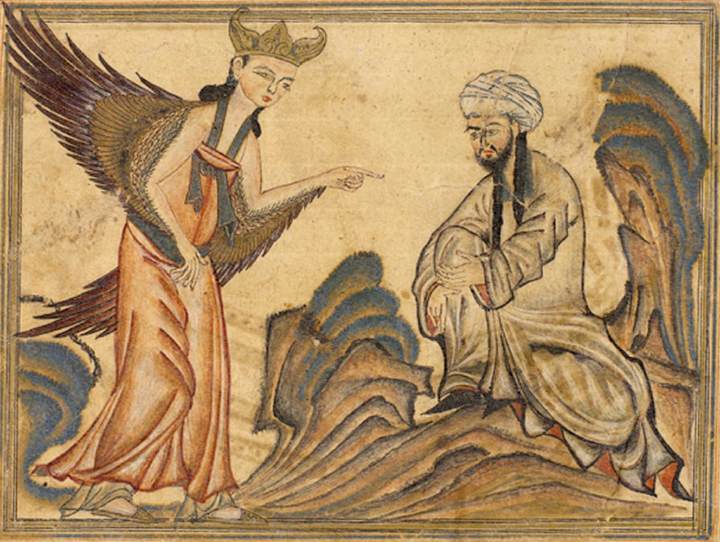Since Robert Spencer is a political operative, let me begin by saying
that I don't support his agendas, and know very well why he *really* wrote this
book. (Clue: Spencer is the director of Jihad Watch, a program of the David
Horowitz Freedom Center.)
That being said, "Did Muhammad Exist" is, admittedly, a good
introduction to the revisionist view of Muslim origins and early Muslim
history. For rather obvious reasons, it doesn't "solve" the issue,
but it could be read with some profit by those who simply want a quick overview
of it.
Virtually everyone regards Muhammad as a real historical character. The
canonical Muslim stories about him certainly seem to have a historical kernel.
They portray Muhammad as a persecuted preacher of monotheism in a hostile pagan
environment, who after a series of armed confrontations with his adversaries at
Mecca and Medina became a political ruler in the period immediately before the
Arab conquests of Persia, Syria and Egypt. There is a certain compelling
historical logic to this picture. Somebody must have invented Islam and united
the Arabs before their successful military-political exploits. The Muslim
sources also talk about factional struggles within Muhammad's community after
his death, including a budding Sunni-Shia split. This, too, sounds logical. Thus,
very few people have questioned the veracity of the Muslim narratives. There
doesn't seem to be any particular need to do so. Stripped from their miraculous
elements, such as Muhammad's meeting with Gabriel, the stories about his life
and times sound like a straightforward historical chronicle.
Of course, the revisionists beg to differ. They point out that the first real
biography of Muhammad wasn't composed until 125 years after his death, and is
known only from an even later work which quotes it profusely. No contemporary
sources mention Muhammad. The earliest Christian accounts of the Arab conquest
don't mention Islam, the Koran or Muhammad. They refer to the Arabs as pagans,
Ishmaelites, Saracens, Muhajirun or Hagarians, but never call them Muslims. Only
the term "Muhajirun" sounds Muslim. (It refers to Muhammad's earliest
companions who left Mecca for Medina together with the Prophet. Some of them
became caliphs after Muhammad's death, and led the Arab conquests. At least
according to the standard, non-revisionist view.) One revisionist, Patricia
Crone, even claims that Mecca wasn't a centre of trade and pilgrimage during
Muhammad's time. The town was actually a small backwater, yet the story of
Muhammad's life claims that he was persecuted by the rich and powerful clans in
Mecca due to his criticism of their wealth and pagan practices.
The revisionists also point out that Arab coins and inscriptions don't mention
Islam or the Koran during the first six decades of the Arab conquests. The
earliest Umayyad caliphs minted coins showing crosses. One coin shows a figure
named "Muhammad" wearing a cross! When the caliph Muawiyah demanded
the conversion of the Byzantine emperor Constantine the Bearded to the new
religion, he didn't mention Islam, the Koran or Muhammad. He simply talked
about the God of Abraham.
Finally, the revisionist school also takes apart the Koran itself. It's well
known that the Koran is written in a very strange, cryptic and elliptic
language, quite unlike any known Arab dialect. (Some modern translations have
attempted to mimic this peculiar style, making them extremely difficult to
understand.) To Muslims, the strangeness of the Koranic language is simply
another proof of its divine origins. However, other interpretations are possible.
Apparently, the text of the Koran originally lacked diacritical marks. Since
many Arabic letters are identical without them, this would have made the Koran
almost impossible to understand, except to a tiny handful of initiates. The
scholar Christoph Luxenberg believes that the Koran becomes more understandable
if quite different diacritical marks are added to the Arabic letters.
Sensationally, Luxenberg claims that parts of the Koran sound like a
Syriac-Aramaic Christian lectionary! If true, this would mean that Islam was
originally a Christian heresy, a claim also made by some early Christian
polemicists, who claimed that Muhammad had been instructed by an Arian monk.
Spencer believes that Islam as we know it today was pretty much invented by the
caliph Abd al-Malik and his governor Hajjaj ibn Yusuf during the 690's (about
sixty years after Muhammad's death in 632) to serve as the state religion of
the rapidly expanding Arab empire. Simultaneously, the Arab language was
introduced in place of Aramaic, the earlier lingua franca of the Umayyad
caliphate (which was based in Damascus). Even Muslim sources claim that Hajjaj
ibn Yusuf collected all extant copies of the Koran, standardized the text and
then burned all deviant copies. (A similar procedure is also attributed to the
earlier caliph Uthman.) Clearly, something was going on. When the Umayyad
dynasty was overthrown by the Abbasids in 750, a new period of orthodox
invention began, with the publication of the first biography of Muhammad and
voluminous collections of hadiths (stories about the Prophet's words and
deeds). To Spencer, this too was a political manoeuvre, to portray the Abbasids
as pious and the overthrown Umayyads as heretics.
And no, I haven't checked any of the claims of "Did Muhammad exist".
Yet!
One problem with the book is that Spencer can't make up his mind about what
actually happened before Abd al-Malik's supposed invention of Islam. Sometimes,
he suggests that early Islam was really a form of Arian Christianity originally
based in Syria. At other times, he claims that the Arab conquerors were
outright pagans. A third option is that they were a kind of monotheists in
general, and had been so for a considerable time before the invasions began.
Perhaps it's uncharitable to accuse a short, popularized overview of containing
too many loose ends, but "Did Muhammad exist" *does* contain too many
of those...
Personally, I veer towards the traditional scenario. The Umayyads saw Islam as
an exclusive, elitist religion for the Arab conquerors. Instead of converting
the Christians, they simply superimposed their own rule on top of remaining
Byzantine structures. Many people at Muawiyah's court in Damascus were
Christians, so the usage of the Aramaic language rather than Arabic would have
been natural. The crosses at "Muslim" coins were probably a form of
clever statecraft, since most Umayyad subjects were still Christians. In a
similar manner, the Roman emperor Constantine the Great (who was a Christian)
originally appeased the pagans by promoting the sun cult alongside
Christianity. A more trivial possibility is that the Arab rulers simply reused
Byzantine coins! To us, who are used to fanatical Wahhabis, this sounds
unbelievable, but it's neither more nor less strange than, say, Peter and Paul
worshipping in the Temple at Jerusalem, something later generations of Gentile
Christians may have found pretty weird indeed. That the early Umayyads had
different religious sensibilities than later Umayyads, Abbasids or Wahhabis
doesn't necessarily disprove that they were Muslims. As for Christian writers
not mentioning Islam, perhaps they simply weren't interested in the details of
the religion of their conquerors. Besides, the Christian accounts of the alien
creed certainly sound compatible with Islam: they mention the Muhajirun, a
prophet with a sword, polygamy, the important role played by Hagar and Ishmael,
etc. What's the problem, really?
Spencer implies that Aisha, Abu Bakr, Umar, Uthman and Ali were fictitious
personages, just like Muhammad, but what on earth would be the point of
inventing them? Who would invent Aisha, who came close to being a female ruler
in an intensely patriarchal culture? Muawiyah became caliph immediately after
Ali, yet Spencer seems to be suggesting that Ali was an invented figure. Nobody
denies that Muawiyah existed. Is it really likely that the dividing line
between fiction and historical fact is this neat?
That being said, I don't doubt that Islam has changed its character several
times during its history. All religions do, and there is no reason to believe
that Islam was any different. As already mentioned, Muslim tradition says that
Uthman burned alternative versions of the Koran. This would have been only a
few decades after Muhammad's death. Apparently, a similar feat is attributed to
Hajjaj ibn Yusuf at a somewhat later point. This suggests that Islam split in
different groups early on, much like Christianity, Mormonism, Theosophy or any
other religious group we're familiar with. Burning the works of
"heretics" is standard practice, when the "heretics"
themselves aren't available. Christians did the same thing.
Indeed, even the Koran itself suggests early changes in Muslim beliefs and
practices. Originally, Muhammad and his supporters prayed facing Jerusalem,
kept the Sabbath and wore Jewish dress! Later, they began to face Mecca, had
their main prayers on Fridays, and changed their manner of dress.
Interestingly, Muhammad wanted the Jews to accept him as a prophet in the Old
Testament tradition, but rejected their legacy after violent conflicts with
Jewish tribes in Medina. This suggests that Islam was originally a Jewish or
Judaizing sect, which adopted a more distinctive Arabic style only after
Muhammad's elevation to Arab "national" ruler.
Another strange anomaly in Islam is the role of Jesus. According to Muslim
tradition, Jesus was born of a virgin, worked miracles and ascended to Heaven á
la Elijah and Enoch. On Judgment Day, Jesus will return and set up a kind of
millennial kingdom in Jerusalem. Note the weird discrepancy between Jesus and
Muhammad, who had a natural birth, wasn't a miracle-worker, died a natural
death and promoted worship of God in Mecca, not Jerusalem. (Jerusalem is number
three in the Muslim hierarchy, after Mecca and Medina.) Yet, Muslims claim that
Muhammad rather than Jesus is the Seal of the Prophets! At least to an outsider
like myself, this makes no sense, unless we are dealing with two different
views of Jesus' importance harmonized at a later date. Perhaps Islam was
originally a Jewish Christian sect? Or perhaps it was originally a Jewish sect,
which was Christianized later, when the Arabs came in touch with Syriac,
Egyptian and Byzantine Christians after their conquests? But note that none of
this means that Muhammad didn't exist, or that there was *no* continuity at all
between his ideas and those of later Muslims.
While I don't believe that "Did Muhammad exist" has managed to
conclusively prove its point, I nevertheless recommend this book for those
interested in the vagaries of this particular historical debate.
And yes, Robert Spencer is looking for serious trouble. But then, that doesn't
come as much of a surprise, does it?



